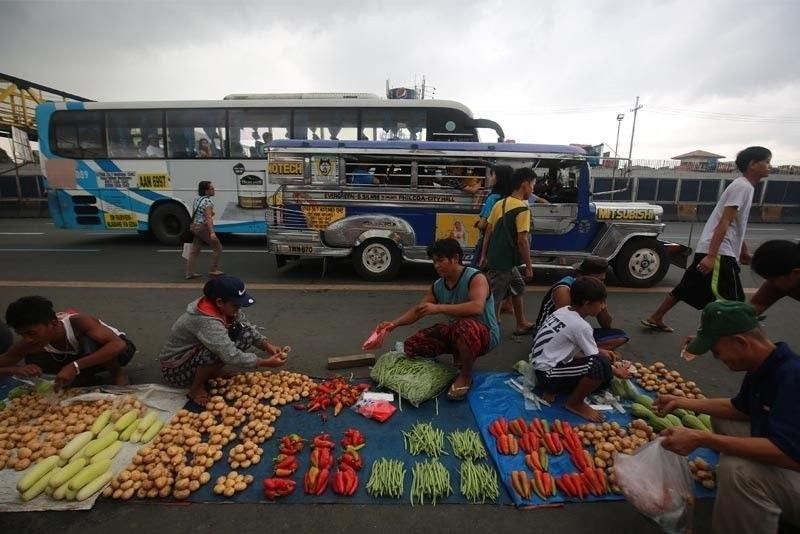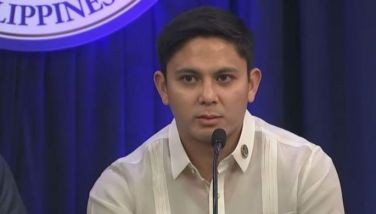‘Stop inflation first before fuel tax hike’

Palace: No final decision yet on increase
MANILA, Philippines — Before they even think of pushing ahead with the second round of fuel excise tax hike next year, the country’s economic managers should first roll out safety nets for the poor and find ways to temper further increases in the prices of basic goods, senators said yesterday.
Sen. Sonny Angara, chairman of the Senate committee on ways and means, and Sen. Aquilino Pimentel III issued separate statements on the plan of the Development Budget Coordinating Council (DBCC) to proceed with the scheduled increase in excise taxes on gasoline and diesel in 2019 as stipulated under the second phase of the Tax Reform For Acceleration and Inclusion (TRAIN) law.
Angara was principal author of TRAIN while Pimentel was Senate president when the controversial measure was passed and enacted by Malacañang.
But presidential spokesman Salvador Panelo said DBCC’s proposal would still have to be thoroughly discussed at a Cabinet meeting on Tuesday.
“This recommendation is still subject for discussion in next Tuesday’s Cabinet meeting. We cannot limit this issue in a purely economic perspective,” Panelo said.
“We note the sentiments of the Filipino consumers and the President will certainly weigh in the social costs involved. Due regard, however, must also be given to the dictates stipulated under the law, which only Congress can modify,” he added.
“We advise the public to wait for the President’s decision in this regard. The President’s decision will, as always, be based on national interest and benefit to the people,” Panelo said.
Angara acknowledged that international prices of petroleum have been going down and will continue to decline next year, but said inflationary pressures remain.
The decline in global crude prices led to seven consecutive weeks of price rollbacks, with pump prices of gasoline and diesel decreasing by P9.85 per liter and P8.40 per liter, respectively.
The P2 per liter of fuel increase is part of the TRAIN law enacted last January. Malacañang earlier announced it was suspending the increase as the prices of crude continued to soar even as economic managers predicted they would eventually stabilize by the end of the year.
However, these oil price reductions have to be felt by Filipinos, according to the senators.
“The rollbacks should not end there. These should be followed by rollbacks in the prices of basic commodities,” Angara said. “The decline in the prices of basic goods should be alongside the downward movement of petroleum prices.”
He added there is no information yet if the government has provided in full the social mitigating measures promised, especially the unconditional cash transfer, subsidies for public utility vehicle drivers and discounts, which were primarily put in place for the protection of Filipino families.
Pimentel described inflation “as a dangerous phenomenon which should be slain on sight when it rears its ugly head.”
“Hence our economic managers should make up their minds on whether to fight inflation or pursue revenues. I suggest we fight inflation now,” Pimentel said.
Suspension still possible
Albay Rep. Joey Salceda said the country’s economic managers – with support from the President – could recommend the suspension of fuel tax hike for next year if necessary.
“All they have to do is to send us a (draft) joint resolution of the House of Representatives and the Senate suspending the imposition of the increase next year and we will consider it,” he said in a television interview.
Opposition and leftist lawmakers, as well as consumer groups, have been demanding the scrapping not only of the 2019 installment of the three-year fuel tax hikes but also the levies imposed this year under TRAIN.
They said these impositions have caused inflation – or the rate of increase in the prices of goods and services – to steadily go up since January to 6.7 percent in September and October.
Salceda made the statement in reaction to the reported change of heart of the administration’s economic managers led by Finance Secretary Carlos Dominguez III on their recommendation to suspend the 2019 adjustment.
The economic team submitted its recommendation for suspension to Duterte in October, when prices of crude oil in the world market were going up. Under the TRAIN law, if crude cost breaches $80 per barrel, the tax increase for the succeeding year would be suspended.
On Nov. 14, Budget Secretary Benjamin Diokno, a member of the economic team, claimed that Duterte has already approved their suggestion.
“I just got a communication from the Executive Secretary (Salvador Medialdea) saying that our proposal to suspend the P2 additional excise tax on oil next year has been approved,” Diokno told reporters.
Salceda said the economic managers were wrong in submitting their recommendation to the President.
He said the provision of the law on the suspension of the 2019 increase if crude cost hits $80 per barrel “is self-executing” and does not require presidential intervention.
He said if Dominguez, Diokno and their colleagues want next year’s increase suspended despite decreasing crude prices, they could make a recommendation to Congress.
“It is the House and the Senate that could pass a joint resolution which in effect would amend the TRAIN law to temporarily suspend next year’s increase,” he added.
Inflation target stays
Even if the second phase of fuel excise tax hike pushes through, inflation is likely to remain on target at two percent to four percent in 2019, DBM’s Diokno said.
“We had an emergency meeting yesterday and the central bank is part of DBCC. We asked them their views and they said inflation will still be on target despite the P2 adjustment by next year,” Diokno said in an interview with ABS-CBN News Channel.
According to Diokno, the price of diesel in 2019 is expected to settle at around P34 per liter should the scheduled P2 increase in petroleum excise tax be implemented.
This is lower than the January 2018 price of fuel at P40.45 per liter and the current price of P38.80 per liter.
Diokno said he is also pushing for a review of the minimum fare hike for public utility jeepneys, given the projected further decline in diesel prices next year.
“In fact, at this time, I would recommend that we review also that adjustment,” he said.
The budget chief said jeepney drivers would still benefit from lower fuel prices even if the minimum fare is reverted back to previous level.
“The jeepney drivers are feeling that. They are getting higher income as a result of the significant drop. Between October, the peak, and current price, there has already been an P11 drop for gasoline and for diesel it’s also P11.52 and next week, another possibly P2 reduction in price,” he said.
Meanwhile, the Federation of Free Workers (FFW) yesterday welcomed the move of the Bureau of Internal Revenue (BIR) to withdraw a memorandum circular imposing taxes on the premium paid for health care cards.
According to FFW president Sonny Matula, the circular is disadvantageous to the Filipino people and should not have even been considered in the first place by the BIR.
“This change of heart by the BIR might have just saved Christmas for many of our hardworking employees who a few weeks ago, faced the prospects of losing their 13th month pay to taxes they would have paid for their health card,” he said. – With Jess Diaz, Christina Mendez, Mary Grace Padin, Sheila Crisostomo
- Latest
- Trending





























